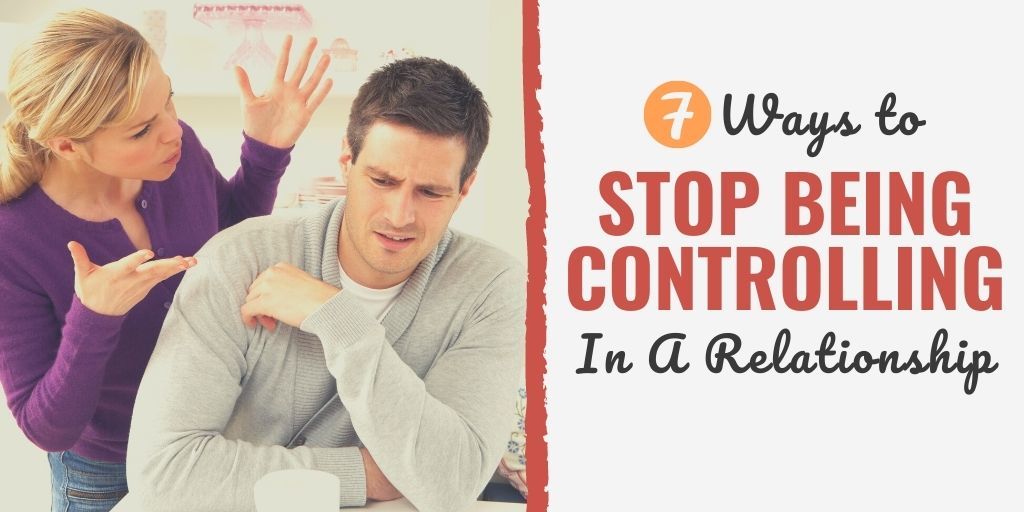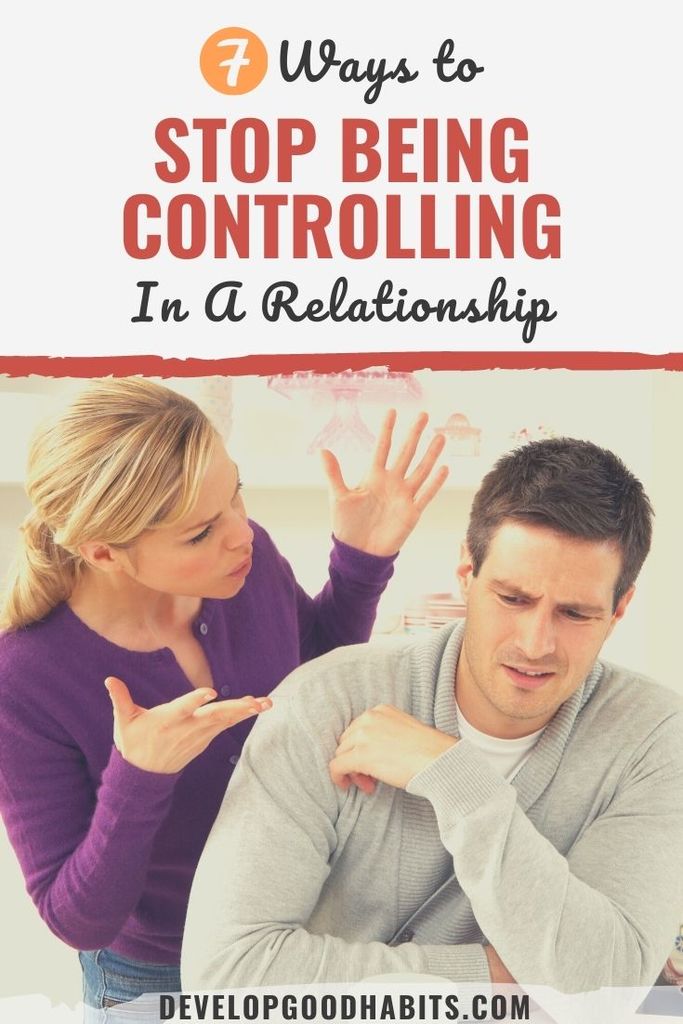There might be affiliate links on this page, which means we get a small commission of anything you buy. As an Amazon Associate we earn from qualifying purchases. Please do your own research before making any online purchase.
It is not easy to look at yourself in the mirror and see that you are the one who is being controlling in a relationship… whether that relationship is romantic, familial or friendly.
Part of the reason is that the characteristics of someone who is controlling doesn’t always present in the same way.
Being controlling doesn’t mean that a person is yelling or putting someone down all of the time. It can be much more subtle.
For some people, it may come across as excessive concern or worry. For others, it’s a bombardment of unsolicited advice or nagging. Poking their nose where it doesn’t belong.
To figure out if you are being controlling, you need to ask yourself a few questions. Some of the most common are:
If you do decide that you have a controlling personality, and believe it is hurting your relationships, it’s not too late to stop… but it takes work.
Sometimes even professional help.
In this article, I will provide 7 actionable steps to help you stop being controlling… or at least get you on the right path.
1. Learn To Control Your Anxiety By Identifying Your Stressors
The need to be controlling often stems from anxiety… anxiety driven by fear, stress or uncertainty.
What causes you stress in your life?
How is that connected to your behavior towards others?
If you are stressed about finances, for instance, you may continuously ask your wife to account for every dollar she spends. You may ask to see receipts or credit card statements.
She will likely view this as a lack of trust in her… or disrespect. That you are controlling her the same way you would a child.
You, on the other hand, are merely trying to keep spending in check and your family out of debt.
Your intentions are honorable, but the way you are letting your anxiety dictate your behavior is not.
It is controlling.
Instead of demanding that she answer to you, try explaining the reasons behind your actions and seek her help moving forward to balance and maintain a budget.
Once you identify what stresses you out, you will be in a position to connect that to certain behaviors and adjust accordingly.
2. Identify Your Insecurities
Controlling behavior can sometimes be the manifestation of insecurities instilled upon you as a child. Thoughts of never being good enough or having to be the best.
As an adult, you may view this as a second chance to set the tone of your life… and the lives of those closest to you.
There are also those insecurities that don’t present themselves until we are in a particular relationship.
Things like jealousy, trust issues and inadequacy. Self-esteem can also play a role.
If you want to stop being controlling, you need to pinpoint your insecurities and face them head-on.
In most instances, you will find that one insecurity is a combination of multiple factors.
For example, if you’ve put on a few pounds since having a baby… you may start to feel less attractive. If you feel less attractive, you may become jealous of your husband’s pretty new intern. You then may start to question him every time he says he’s working late or having drinks with his co-workers. You start to lose trust in him and find yourself going through his texts while he is in the shower… looking for validation.
Next, you start scheduling more things for you to do as a couple… so that you’re rarely ever apart and he never has time for drinks after work.
Do you see what’s happening here?
One tiny insecurity has led to a slew of potentially avoidable and catastrophic ones… insecurities that have now put your relationship in jeopardy by causing you to behave irrationally.
You are trying to control him for necessarily no good reason.
And trust me on this… if you try and smother someone too much, you will be giving them all of the fuel he or she needs to bring your worst nightmares to life.
If your partner feels trapped and unhappy for too long, they will find happiness elsewhere.
So instead of placing the blame where it isn’t warranted, work on improving yourself.
Join a gym if you’re unhappy with your weight… or change your wardrobe if you’re feeling unnoticed.
Find a new job or hobby that makes you feel good, so you don’t take out all of your frustrations on your family.
Often, being controlling is a misplaced reaction to something else that isn’t working for you.
3. Watch Your Mouth: Learn To Recognize and Eliminate Controlling Words or Phrases
Words are powerful things.
They convey emotions of gratitude, respect, approval, love and joy.
But they can also express feelings of sadness, disappointment, resentment, disgust, anger and hatred.
Many people who are controlling will use words as weapons.
Sometimes they will be blunt and painfully direct.
Other times, their disdain will be expressed in a much less obvious way. Like a ninja sneaking up on you.
If you want to stop being controlling, it is important to be aware of the way in which you use certain words or phrases and how others may perceive them.
Phrases like, “I only want what’s best for you” or “Do you really want to do (or wear) that?” are examples of passive aggressive words that can be construed as controlling behavior.
Few people will respond well to continuously being told they are poor decision makers. After a while, they will either begin to resent you for making them question themselves… or else eventually cut you out of their life.
Think about what that person means to you before choosing words you can’t take back.
4. Give Up Trying to Control the Outcome Of Certain Things
As much as we’d like to think we have our act together, life doesn’t always go according to plan.
Most people understand that and are able to roll with the punches, as they say.
Controlling people, on the other hand, take issue with the notion of not having things go their way.
They will work tirelessly to retain control of a situation or person… even if it puts strain on their relationships.
These people may make their child study for hours after school, not allowing them to socialize or watch any television during the week… just so they get straight A’s.

The problem with that is no matter how hard you make them work, there is still a chance they will struggle in certain areas and make mistakes. Partly because you are being so hard on them that it causes stress… but also because they are human.
If you want to stop being controlling you need to realize that not everything in life is within your control.
Try as you might, you can’t stop people from living their lives. And you can’t prevent bad things from happening.
What you can control is how you react.
You can also try forming more realistic expectations that everybody can work with. This way, you are less likely to be disappointed.
5. Determine Whether Or Not Your Efforts Are Actually Working
Now that you’ve admitted to being controlling, it’s time to look at where it’s gotten you.
Has it worked out for you?
Are you happy? Is your partner? Are you children?
Do your friendships feel reciprocal?
If the answer to any of these questions is “no”… then you need to figure out what works and what doesn’t.
There will be times that call for you to take control of a situation.
If you see that your child is hanging out with friends that are causing her to get into trouble, or behave differently, you may need to remove her from the situation. Demand that she no longer see them.
You may also enroll her in after school activities, or volunteer programs, that get her back on track.
While she may see this as you being controlling, which you are, your actions are necessary in order to keep her from going down a path she can’t return from.
Conversely, if your wife has a new friend you don’t like just because you share different political viewpoints… you have no right to tell her they can’t be friends. You don’t have to spend time with that person and should trust that your wife is not going to change.
Respecting others’ viewpoints, and politely agreeing to disagree, is part of the process when you’re trying to stop being controlling… as is being able to identify those moments when taking control is warranted.
6. Ask Someone You Trust to Assess Your Behavior
Sometimes you need to step away from a situation in order to gain perspective. If you are too close to it, you may not always see clearly.
There are also times when you may need to enlist the help of someone you trust to give you an unbiased opinion about something.
That is especially true if you want to stop being controlling.
This person can be a family member, friend, colleague. It can even be an ex-girlfriend or boyfriend, assuming you’re still on speaking terms.
The important thing is that you value their opinion and are willing to hear it.
Really hear it.
This person should also be able to give you constructive criticism, without making you feel bad about your behavior… because that would likely cause you to stop listening and ignore whatever good advice they have to offer.
7. Opposites Can Attract: Embrace The Differences Between You and Your Partner
Most controlling people do not play well with others.
If two people with controlling behavior are in a relationship, chances are they will but heads often because neither will want to budge.
If someone who is controlling is in a relationship with someone more passive, it is likely to be very one-sided and less fulfilling.
The ideal relationship is a symbiotic one. A partnership where two different people can embrace each other’s distinct personalities and work together to help each other grow.
While it is important to form relationships with people that have similar interests and goals… it would also be incredibly boring if you didn’t have any opinions, interests or dreams of your own.
If you want to stop being controlling, you need to appreciate what sets the two of you apart.
Instead of trying to force your wife to watch football with you on Sunday afternoons, even though you know she is bored by it… why not find a sport or other activity that you both enjoy doing before the games start?
You can spend time together going for a hike or taking a yoga class.
Go out for a nice breakfast at your favorite spot.
Then, when game time comes, she will feel that her needs have been met and may even surprise you by watching the first half.
If your complaint with your partner has more to do with personality conflicts than their interests… the art of compromise still applies.
You can’t necessarily change a person who is sloppy or fickle, for instance.
Certain traits are innate, not learned. And it can be very hard to make someone change something about themselves that they have been doing for most or all of their life.
The best you can hope for is finding common ground you can stand on together… without it breaking.
Final Thoughts On How to Stop Being Controlling
Just because you can be controlling at times, does not make you a bad person.
The fact that you are seeking help to stop being controlling is proof of this.
You can’t be too hard on yourself.
The guilt will only set you back.
Your desire to control things stems from someplace.
Whether it was a person or circumstances that made you this way… it can be unlearned with time, discipline and patience.
You just need to want to change.
And to let it be known that you’re willing to work on it.

Nicole Krause has been writing both personally and professionally for over 20 years. She holds a dual B.A. in English and Film Studies. Her work has appeared in some of the country’s top publications, major news outlets, online publications and blogs. As a happily married (and extremely busy) mother of four… her articles primarily focus on parenting, marriage, family, finance, organization and product reviews.



